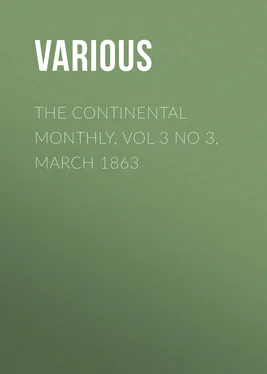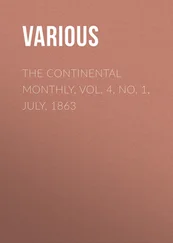Various - The Continental Monthly, Vol 3 No 3, March 1863
Здесь есть возможность читать онлайн «Various - The Continental Monthly, Vol 3 No 3, March 1863» — ознакомительный отрывок электронной книги совершенно бесплатно, а после прочтения отрывка купить полную версию. В некоторых случаях можно слушать аудио, скачать через торрент в формате fb2 и присутствует краткое содержание. Жанр: foreign_antique, periodic, Языкознание, Политика, foreign_edu, на английском языке. Описание произведения, (предисловие) а так же отзывы посетителей доступны на портале библиотеки ЛибКат.
- Название:The Continental Monthly, Vol 3 No 3, March 1863
- Автор:
- Жанр:
- Год:неизвестен
- ISBN:нет данных
- Рейтинг книги:5 / 5. Голосов: 1
-
Избранное:Добавить в избранное
- Отзывы:
-
Ваша оценка:
- 100
- 1
- 2
- 3
- 4
- 5
The Continental Monthly, Vol 3 No 3, March 1863: краткое содержание, описание и аннотация
Предлагаем к чтению аннотацию, описание, краткое содержание или предисловие (зависит от того, что написал сам автор книги «The Continental Monthly, Vol 3 No 3, March 1863»). Если вы не нашли необходимую информацию о книге — напишите в комментариях, мы постараемся отыскать её.
The Continental Monthly, Vol 3 No 3, March 1863 — читать онлайн ознакомительный отрывок
Ниже представлен текст книги, разбитый по страницам. Система сохранения места последней прочитанной страницы, позволяет с удобством читать онлайн бесплатно книгу «The Continental Monthly, Vol 3 No 3, March 1863», без необходимости каждый раз заново искать на чём Вы остановились. Поставьте закладку, и сможете в любой момент перейти на страницу, на которой закончили чтение.
Интервал:
Закладка:
Various
The Continental Monthly, Vol 3 No 3, March 1863 / Devoted To Literature And National Policy
TURKEY
The decline of the Turkish Empire has furnished an eloquent theme for historians, who have ever made it the 'point and commendation of their tale.' Judging from its decline, they have predicted its fall. Half a century ago, the historian of the middle ages expected with an assurance that 'none can deem extravagant,' the approaching subversion of the Ottoman power. Although deprived of some of its richest possessions and defeated in many a well-fought field, the house of Othman still stands—amid crumbling monarchies and subjugated countries; the crescent still glitters on the Bosphorus, and still the 'tottering arch of conquest spans the ample region from Bagdad to Belgrade.'
Yet, how sadly changed is Turkey from her former self—how varied the fortunes of her classic fields! The physical features of the country are the same as in the days of Solyman the Magnificent; the same noble rivers water the fertile valleys, and the same torrents sweep down the mountain sides; the waves of the Ægean and Mediterranean wash the same shores, fertile in vines and olive trees; the same heaven smiles over the tombs of the storied brave—but here no longer is the abode of the rulers and lawgivers of one half the world.
It has been said, and with some degree of truth, that the Turks are encamped, not settled in Europe. In their political and social institutions they have never comported themselves as if they anticipated to make it their continuing home. Their oriental legends relate how the belief arose in the very hour of conquest that the standard of the Cross should at some future day be carried to the Bosphorus, and that the European portion of the empire would he regained by Christians. From this superstitious belief they selected the Asiatic shore for the burial of true Mussulmans; nor was it altogether a fanciful belief, for in the sudden rise of Russia, Turkey foresaw the harbinger of her fall, and recognized in Muscovite warriors the antagonists of fate.
A nation to be long-lived must rise higher and higher in the scale of civilization; must approach nearer and nearer its meridian, but never culminate. The Athenians reached the zenith of their glory in the age of Pericles, and lost in fifty years what they had acquired in centuries. The Turks attained their meridian greatness in the reign of Solyman the Magnificent—from which time dates their decline.
If we make a comparison between Turkey and her formidable neighbor, Russia, we shall find that the latter adopted, while the former resisted reforms. Turkey was in the fulness of her power when Russia had not yet a name. The spirit of the Ottomans was remarkably exclusive. They regarded themselves as a separate and distinct people; they were conquerors, and as such thought themselves a superior race—men who were to teach and not to learn. In their intercourse with other nations, they borrowed nothing, and out of themselves looked for nothing. Their feeling of national glory was not extinguished by national degradation, but cherished through ages of slavery and shame. But the world is a world of progress. A nation cannot remain stationary; she must advance or retrograde. Turkey is not what she was, while Russia, with the rest of Christendom, has advanced; her faults grew with her strength, but did not die with her decay. It will not be sufficient for her merely to regain her former power; she must overtake Christendom in the progress made during her decadence. Her spirit of vitality is not yet extinct; it wants guidance and development to strengthen and elevate it. There is still hope of reforming the Turkish empire without that baptism of blood which many have urged and are still urging. Indeed, Lord Palmerston declared in Parliament that Turkey has made a more rapid advance and been improved more during the last ten years (he made this statement in 1854, and Turkey has been rapidly progressing since) than any other country in Europe.
Before considering the question of reform, it will be necessary to take a cursory view of Turkish history and character.
While the monarchs of Constantinople were waging war with Persia, and both empires were tottering; while the Christian religion gave rise to different sects, hating each other with intense and fanatical hatred, a silent power was rising among the Turks, which was destined to subvert empires and found a new religion. Their original seat was among the Altai mountains, where they were employed by their masters in working iron mines. They rose in rebellion, threw off their allegiance, and made incursions into Persia and China, proving themselves formidable enemies. From being a weak and enslaved people they became the allies and conquerors of the Byzantine emperors. 'With the Koran in one hand,' says Macaulay, 'and the sword in the other, they went forth conquering and converting eastward to the Bay of Bengal, and westward to the Pillars of Hercules.' They became a terror to the nations that had beheld with contempt their rising greatness. Amid the expiring glories of the Roman world they made Constantinople the capital of their empire. It was all that the oriental imagination could desire. Rendered by its fortifications impregnable, and situated on the Bosphorus, whose dark blue waters flow between shores of unrivalled beauty, where nature and art had reared their grandest monuments, it surpassed in wealth and grandeur Nineveh and Babylon.
From this stronghold, which had been the cradle of Christianity, and which had witnessed the dying struggle of the Roman empire, the conquerors, maddened with the victories and crowned with the wealth which years of perpetual war had heaped upon them, mustered their armies and sallied forth. They subjugated many countries, but copied none of their virtues; and to-day their degenerate descendants still retain most of their original traits of character. Their religious sense is deep, but theirs is a religion which blunts and stupefies the intellectual faculties, and makes man fit only to perform a score of prostrations each day. It inspires courage in war, but it also teaches blind resignation to defeat and disgrace: it teaches morality, but sensuality and ferocity are not inconsistent with its doctrines. Eat, drink, smoke—indulge all the passions to-day, for immortality begins to-morrow! No Turk is so high that he has not a master, none so low that he has not a slave; the grand vizier kisses the sultan's foot, the pasha kisses the vizier's, the bey the pasha's, and so on. Yet their many virtues half redeem their faults. They are proverbial for their hospitality, and charity, which 'covereth a multitude of sins,' is an oriental virtue. They have, too, great love of nationality. The beggar who seeks alms of the Turk with cries and entreaties, will not ask a single para of the Frank (a name applied to all foreigners).
Turkey in Europe, though smaller in extent than the Asiatic division of the empire, is by far the wealthier and more important. It extends from Russia to the Adriatic, and from Hungary to the Euxine sea, the command of which it shares jointly with Russia. The Straits of Constantinople, the Dardanelles, and the Sea of Marmora are free to all friendly nations. The situation of the country, its numerous and safe harbors, are all favorable to commerce. There is every variety of climate, and the soil in every part of the empire is fertile, and, when cultivated, yields productions in the greatest abundance. The agricultural, like the manufacturing industry, owing to the indolence of the people, is much neglected. This indolence is, in a great measure, the result of oppression. Before Russia extended her protection over the provinces, the Turks left agriculture to their tributaries, whom, when wealthy and prosperous, they plundered.
Читать дальшеИнтервал:
Закладка:
Похожие книги на «The Continental Monthly, Vol 3 No 3, March 1863»
Представляем Вашему вниманию похожие книги на «The Continental Monthly, Vol 3 No 3, March 1863» списком для выбора. Мы отобрали схожую по названию и смыслу литературу в надежде предоставить читателям больше вариантов отыскать новые, интересные, ещё непрочитанные произведения.
Обсуждение, отзывы о книге «The Continental Monthly, Vol 3 No 3, March 1863» и просто собственные мнения читателей. Оставьте ваши комментарии, напишите, что Вы думаете о произведении, его смысле или главных героях. Укажите что конкретно понравилось, а что нет, и почему Вы так считаете.












